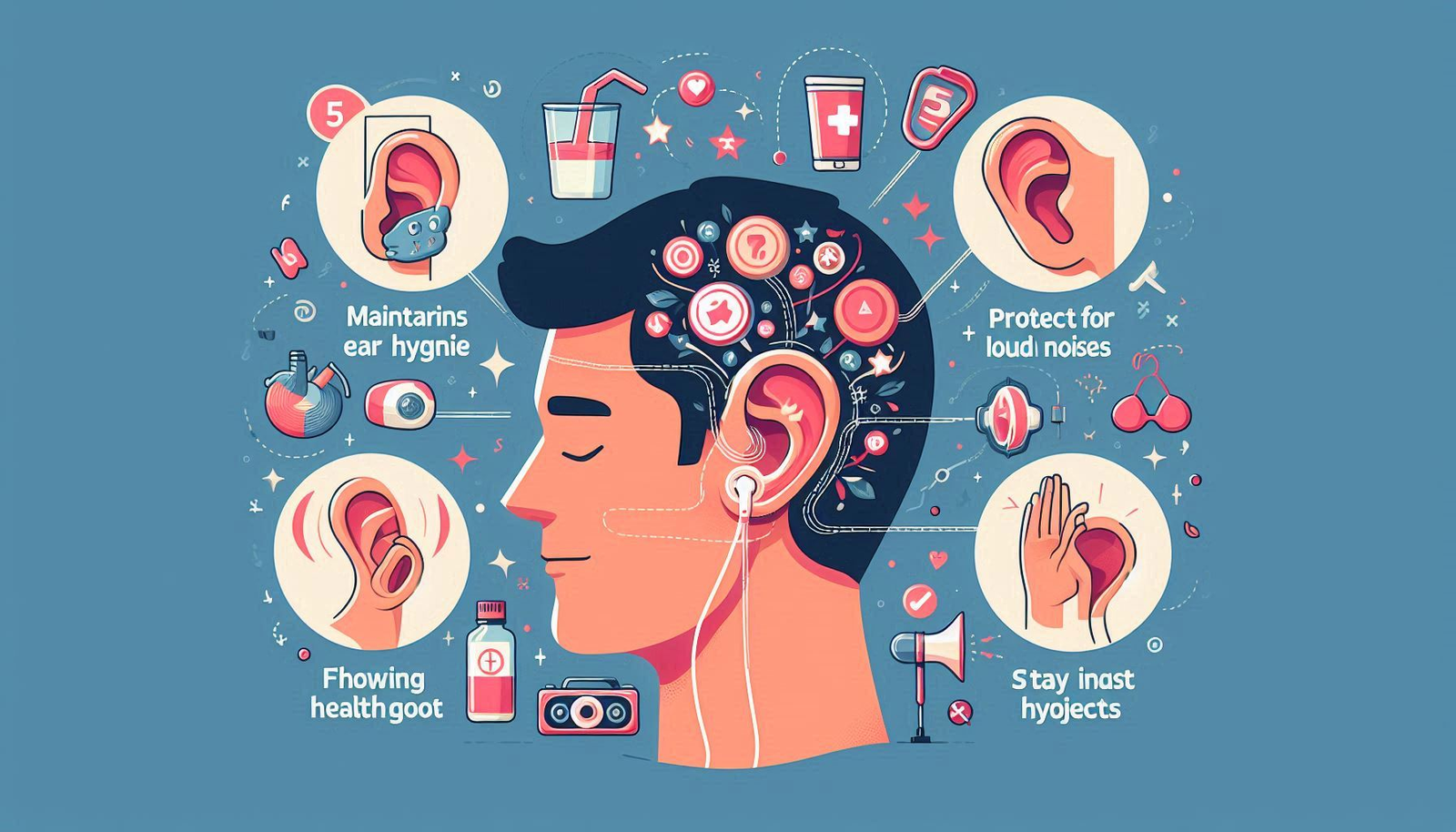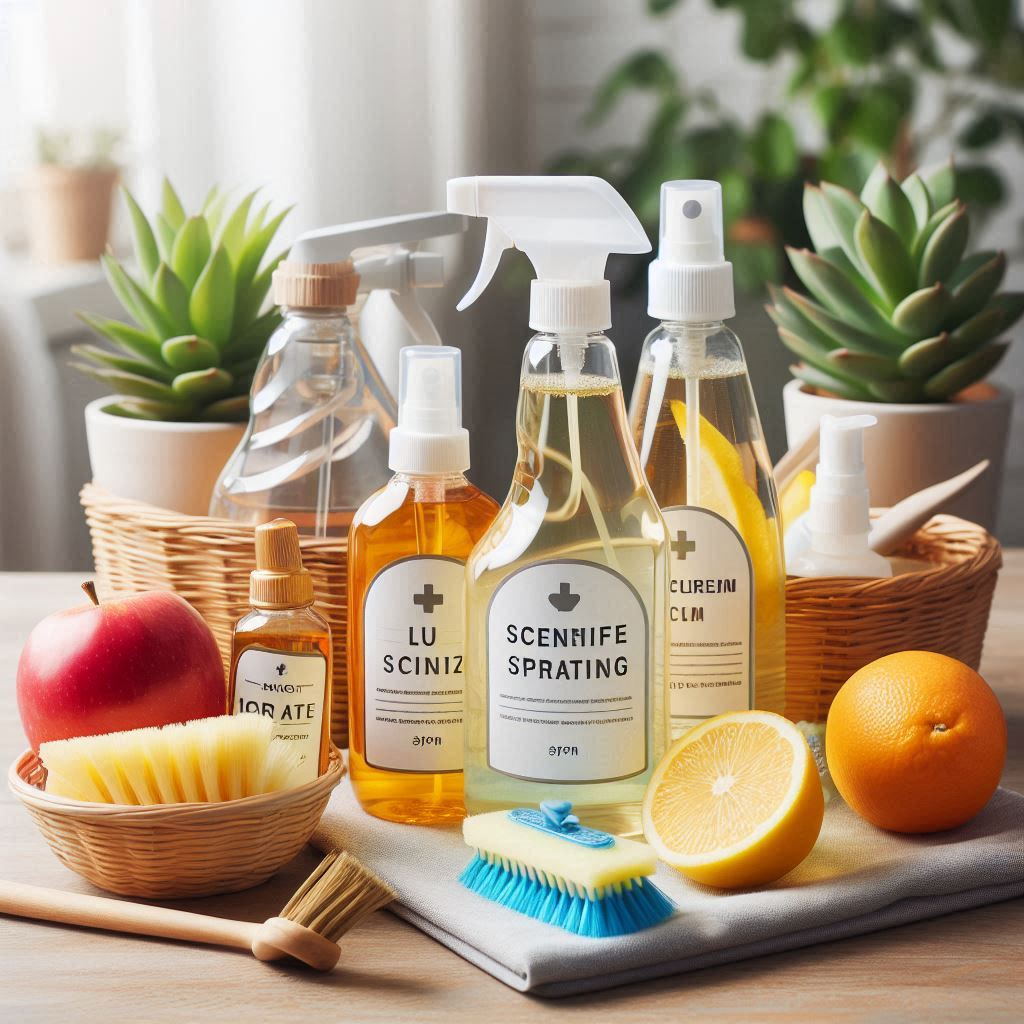
5 Easy Ways to Boost Your Ear Health
5 Easy Ways to Boost Your Ear Health
Discover 5 easy strategies to improve your ear health and protect your hearing effectively. Start your journey to better ear care now.

Introduction
Importance of Ear Health for Overall Well-Being
Ear health is crucial for overall well-being as it directly impacts our ability to hear and communicate effectively. Healthy ears allow us to enjoy sounds, music, and conversations, enhancing our quality of life.
Additionally, good ear health helps maintain balance and spatial orientation, which are essential for daily activities.
Overview of Common Ear Issues and Their Impact on Daily Life
Common ear issues such as ear infections, earwax buildup, tinnitus, and hearing loss can significantly affect daily life.
These conditions can lead to discomfort, pain, and difficulty in hearing, which can impact communication, work, and social interactions. Addressing ear health proactively can prevent these issues and ensure optimal hearing and balance.
Brief Introduction to the 5 Easy Ways to Boost Ear Health
In this article, we will explore five easy ways to boost ear health:
- Maintain Ear Hygiene
- Protect Your Ears from Loud Noises
- Follow a Healthy Diet
- Stay Hydrated
- Avoid Inserting Objects into Ears
By following these simple tips, you can improve your ear health and protect your hearing effectively.

Section 1: Maintain Ear Hygiene
Explanation of the Importance of Keeping Ears Clean
Maintaining ear hygiene is essential for preventing infections and blockages. The ears produce earwax (cerumen) naturally, which helps protect the ear canal by trapping dust and debris.
However, excessive earwax buildup can lead to blockages and discomfort. Proper ear hygiene ensures that the ears remain clean and free from harmful substances.
Benefits of Regular Ear Hygiene for Preventing Infections and Blockages
- Prevents Infections: Regular ear hygiene helps prevent bacterial and fungal infections by keeping the ear canal clean and dry.
- Reduces Blockages: Proper cleaning techniques prevent earwax buildup, reducing the risk of blockages that can affect hearing.
- Improves Hearing: Keeping the ears clean ensures that sound waves can travel freely, improving overall hearing quality.
- Read also: Inner Strength: 7 Strong Ways to Build
Tips for Proper Ear Cleaning Techniques
- Avoid Cotton Swabs: Using cotton swabs to clean the ears can push earwax deeper into the ear canal, causing blockages and potential damage. Instead, use safer methods.
- Use Ear Drops: Over-the-counter ear drops can help soften and remove earwax. Follow the instructions on the packaging for safe use.
- Consult a Doctor: If you experience excessive earwax buildup or discomfort, consult a healthcare professional for safe earwax removal.
- Keep Ears Dry: After swimming or showering, gently dry your ears with a towel to prevent moisture buildup, which can lead to infections.
Section 2: Protect Your Ears from Loud Noises
Explanation of How Loud Noises Can Damage Hearing
Exposure to loud noises can cause permanent damage to the delicate structures within the ear, particularly the hair cells in the cochlea. These hair cells are responsible for converting sound waves into electrical signals that the brain interprets as sound.
Once damaged, these hair cells do not regenerate, leading to noise-induced hearing loss (NIHL). Prolonged exposure to loud noises, such as music concerts, construction sites, or even loud machinery, can accelerate this damage and result in significant hearing impairment.
Benefits of Protecting Ears from Noise-Induced Hearing Loss
- Prevents Permanent Damage: Using ear protection helps prevent irreversible damage to the hair cells in the cochlea, preserving hearing ability.
- Reduces Risk of Tinnitus: Protecting your ears from loud noises can reduce the risk of developing tinnitus, a condition characterized by persistent ringing or buzzing in the ears.
- Maintains Hearing Quality: By minimizing exposure to loud noises, you can maintain better hearing quality and clarity over time.
- Enhances Overall Ear Health: Protecting your ears from loud noises contributes to overall ear health and reduces the likelihood of hearing-related issues.
Tips for Using Ear Protection in Noisy Environments
- Use Earplugs: Wear earplugs in noisy environments such as concerts, sporting events, or construction sites. Custom-fit earplugs provide better protection and comfort.
- Noise-Canceling Headphones: Invest in noise-canceling headphones to reduce ambient noise and protect your ears, especially in loud work environments or during travel.
- Limit Exposure: Reduce the amount of time you spend in noisy environments. Take regular breaks to give your ears a rest.
- Volume Control: Keep the volume at a safe level when using headphones or earbuds. Follow the 60/60 rule: listen at no more than 60% of the maximum volume for no more than 60 minutes at a time.
- Awareness: Be aware of your surroundings and the noise levels. Use smartphone apps to measure decibel levels and ensure they are within safe limits.

Section 3: Follow a Healthy Diet
Explanation of How Diet Impacts Ear Health
A balanced diet plays a crucial role in maintaining ear health. The nutrients we consume support the overall function of the auditory system and help protect the ears from damage caused by environmental factors and aging.
A diet rich in essential vitamins and minerals can enhance hearing ability and prevent ear-related issues.
Essential Nutrients for Maintaining Healthy Ears
- Omega-3 Fatty Acids: These healthy fats support the health of the auditory system and reduce the risk of age-related hearing loss. They also have anti-inflammatory properties that protect the ears from damage.
- Vitamins A, C, and E: These vitamins are powerful antioxidants that protect the ears from oxidative stress and free radical damage. They also support the immune system, reducing the risk of ear infections.
- Magnesium helps protect the hair cells in the inner ear from damage caused by loud noises. It also improves blood flow to the ears, supporting overall ear health.
- Zinc: zinc supports the immune system and helps prevent ear infections. It also plays a role in maintaining the health of the auditory system.
Recommended Foods and Supplements for Ear Health
- Fatty Fish: Salmon, mackerel, and sardines are rich in omega-3 fatty acids.
- Leafy Greens: Spinach, kale, and collard greens are excellent sources of vitamins A and C.
- Nuts and Seeds: Almonds, sunflower seeds, and flaxseeds provide vitamin E and omega-3 fatty acids.
- Fruits: Citrus fruits, berries, and kiwi are high in vitamin C.
- Whole Grains: Whole grains such as quinoa, brown rice, and oats are good sources of magnesium.
- Lean Meats: Chicken, turkey, and lean beef provide zinc and other essential nutrients.
- Supplements: Consider taking a multivitamin or specific supplements that contain the essential nutrients for ear health, especially if you have difficulty getting them from your diet.
Section 4: Stay Hydrated
Importance of Hydration for Ear Health
Staying hydrated is essential for maintaining overall health, including ear health. Proper hydration ensures that the body produces enough fluids to keep the ears functioning optimally.
The inner ear, which is responsible for hearing and balance, relies on a delicate balance of fluids to transmit sound waves and maintain equilibrium.
Benefits of Drinking Enough Water for Maintaining Ear Function
- Prevents Dryness: Adequate hydration helps maintain the moisture levels in the ear canal, preventing dryness and irritation.
- Supports Ear Function: Proper hydration ensures that the fluids in the inner ear are balanced, which is crucial for hearing and balance.
- Reduces Risk of Infections: Staying hydrated helps keep the mucous membranes in the ears moist, reducing the risk of infections and inflammation.
- Enhances Overall Health: Drinking enough water supports overall bodily functions, including those of the ears, contributing to better ear health.
Tips for Staying Hydrated Throughout the Day
- Drink water regularly: aim to drink at least 8 glasses of water a day. Carry a water bottle with you to remind yourself to stay hydrated.
- Eat Hydrating Foods: Include water-rich foods in your diet, such as cucumbers, watermelon, and oranges.
- Limit Caffeine and Alcohol: Both caffeine and alcohol can dehydrate the body, so consume them in moderation and balance with water intake.
- Set Reminders: Use apps or alarms to remind yourself to drink water throughout the day.
- Monitor Urine Color: A light yellow color indicates proper hydration, while dark yellow or amber suggests you need to drink more water.

Section 5: Avoid Inserting Objects into Ears
Explanation of the Risks Associated with Inserting Objects into Ears
Inserting objects into the ears, such as cotton swabs, hairpins, or earbuds, can cause significant damage to the ear canal and eardrum. These objects can push earwax deeper into the ear, leading to blockages and potential infections. Additionally, inserting objects into the ears can cause scratches, cuts, and even perforation of the eardrum, resulting in pain and hearing loss.
Benefits of Avoiding Ear Injuries and Infections
- Prevents Damage: Avoiding the insertion of objects into the ears helps prevent damage to the delicate structures of the ear canal and eardrum.
- Reduces Risk of Infections: Keeping foreign objects out of the ears reduces the risk of introducing bacteria and causing infections.
- Maintains Hearing Quality: By preventing injuries and infections, you can maintain better hearing quality and overall ear health.
- Enhances Comfort: Avoiding ear injuries and infections ensures that your ears remain comfortable and free from pain and discomfort.
Tips for Safe Ear Care Practices
- Use Ear Drops: Over-the-counter ear drops can help soften and remove earwax safely. Follow the instructions on the packaging for proper use.
- Consult a Doctor: If you experience excessive earwax buildup or discomfort, consult a healthcare professional for safe earwax removal.
- Keep Ears Dry: After swimming or showering, gently dry your ears with a towel to prevent moisture buildup, which can lead to infections.
- Avoid Cotton Swabs: Instead of using cotton swabs, use safer methods for cleaning your ears, such as ear drops or consulting a doctor.
- Be Gentle: If you need to clean the outer part of your ears, use a soft cloth or tissue and avoid inserting anything into the ear canal.
Conclusion
Recap of the 5 Easy Ways to Boost Ear Health
- Maintain Ear Hygiene: Keep your ears clean to prevent infections and blockages.
- Protect your ears from loud noises: Use ear protection to prevent noise-induced hearing loss.
- Follow a Healthy Diet: Consume essential nutrients to support ear health.
- Stay Hydrated: Drink plenty of water to maintain ear function and prevent dryness.
- Avoid Inserting Objects into Ears: Prevent injuries and infections by avoiding the insertion of objects into your ears.
Encouragement to Implement These Tips for Maintaining Healthy Ears
By incorporating these five easy tips into your daily routine, you can take proactive steps to maintain healthy ears and protect your hearing. Each tip plays a crucial role in ensuring that your ears remain free from infections, blockages, and damage.
Remember, small changes can make a big difference in preserving your ear health and overall well-being.
Final Thoughts on the Importance of a Holistic Approach to Ear Care
A holistic approach to ear care involves addressing various aspects of your lifestyle, including hygiene, diet, hydration, and protective measures. By taking a comprehensive approach, you can ensure that your ears remain healthy and your hearing stays clear.
Your ears are essential for communication, balance, and enjoying the sounds of life, so prioritize their health in your daily routine. Embrace these tips and enjoy the benefits of healthy ears for years to come.
FAQs
- Why is ear hygiene important? Maintaining ear hygiene helps prevent infections and blockages, ensuring that your ears remain clean and free from harmful substances.
- How can loud noises damage my hearing? Exposure to loud noises can damage the hair cells in the cochlea, leading to noise-induced hearing loss. These hair cells do not regenerate, so protecting your ears from loud noises is crucial.
- What nutrients are essential for ear health? Essential nutrients for ear health include omega-3 fatty acids, vitamins A, C, and E, magnesium, and zinc. These nutrients support the overall function of the auditory system and protect the ears from damage.
- How does hydration affect ear health? Proper hydration ensures that the fluids in the inner ear are balanced, which is crucial for hearing and balance. Staying hydrated also helps prevent dryness and irritation in the ear canal.
- Why should I avoid inserting objects into my ears? Inserting objects into your ears can cause damage to the ear canal and eardrum, leading to blockages, infections, and hearing loss. It’s best to use safer methods for cleaning your ears.
- What are the benefits of using ear protection in noisy environments? Using ear protection helps prevent irreversible damage to the hair cells in the cochlea, reducing the risk of noise-induced hearing loss and tinnitus.
- How often should I clean my ears? Clean your ears regularly, but avoid over-cleaning. Use ear drops or consult a healthcare professional for safe earwax removal if needed.
- Can a healthy diet improve my hearing? Yes, a healthy diet rich in essential nutrients can support ear health and improve hearing ability. Consuming foods high in omega-3 fatty acids, vitamins, and minerals is beneficial.
- What should I do if I experience ear discomfort or hearing loss? If you experience ear discomfort or hearing loss, consult a healthcare professional for a proper diagnosis and treatment. Avoid self-treatment to prevent further damage.
- Are there any natural remedies for ear health? Yes, natural remedies such as using ear drops, maintaining a healthy diet, and staying hydrated can support ear health. However, always consult a healthcare professional before trying new remedies.
By incorporating these five easy tips into your daily routine, you can take proactive steps to maintain healthy ears and protect your hearing. Each tip plays a crucial role in ensuring that your ears remain free from infections, blockages, and damage. Remember, small changes can make a big difference in preserving your ear health and overall well-being. A holistic approach to ear care involves addressing various aspects of your lifestyle, including hygiene, diet, hydration, and protective measures. By taking a comprehensive approach, you can ensure that your ears remain healthy and your hearing stays clear. Your ears are essential for communication, balance, and enjoying the sounds of life, so prioritize their health in your daily routine. Embrace these tips and enjoy the benefits of healthy ears for years to come.



2 Comments
Pingback:
Pingback: